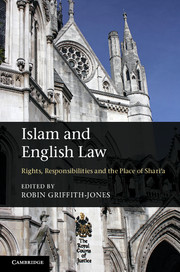Book contents
- Frontmatter
- Contents
- List of contributors
- List of abbreviations
- Preface
- Introduction
- Part I The Archbishop of Canterbury and shariʽa law
- Part II The Archbishop’s proposal for ‘transformative accommodation’
- Shariʽa and secular democracy: is Islamic law compatible with the European Convention on Human Rights?
- Legal pluralism: should English law give greater recognition to Islamic law?
- 7 Family law: current conflicts and their resolution
- 8 Islamic finance, alternative dispute resolution and family law: developments towards legal pluralism?
- 9 Judging Muslims
- 10 From Muslim migrants to Muslim citizens
- 11 Ontario’s ‘shariʽa court’: law and politics intertwined
- Accommodation or conflict: trajectories in the United Kingdom
- Part III Responsibilities and rights
- Part IV Prospect: equality before God and before the law
- Select bibliography
- Index of cases
- Index
11 - Ontario’s ‘shariʽa court’: law and politics intertwined
Published online by Cambridge University Press: 05 April 2013
- Frontmatter
- Contents
- List of contributors
- List of abbreviations
- Preface
- Introduction
- Part I The Archbishop of Canterbury and shariʽa law
- Part II The Archbishop’s proposal for ‘transformative accommodation’
- Shariʽa and secular democracy: is Islamic law compatible with the European Convention on Human Rights?
- Legal pluralism: should English law give greater recognition to Islamic law?
- 7 Family law: current conflicts and their resolution
- 8 Islamic finance, alternative dispute resolution and family law: developments towards legal pluralism?
- 9 Judging Muslims
- 10 From Muslim migrants to Muslim citizens
- 11 Ontario’s ‘shariʽa court’: law and politics intertwined
- Accommodation or conflict: trajectories in the United Kingdom
- Part III Responsibilities and rights
- Part IV Prospect: equality before God and before the law
- Select bibliography
- Index of cases
- Index
Summary
We will be dealing with the major issues and the current realities of family law arbitrations in Ontario. Many conflicting reports are in circulation; it is important to have before us a sequential account.
Family law in Canada is a shared jurisdiction between our federal government and our provincial governments. The division of powers is set out in the British North America Act 1867 and was confirmed in our Constitution Act 1982. Section 91 of the 1982 Act sets out the areas subject exclusively to the Canadian Parliament: these include criminal law, marriage and divorce. Section 92 sets out the areas that fall exclusively within the authority of the provincial legislatures: these include, within each province, the solemnisation of marriage, property rights and civil rights.
The federal Divorce Act applies not only to married people who want a divorce, but also to the custody, access, child and spousal support claims that they make as part of that divorce. Ontario law, under the Family Law Act 1990 and the Children’s Law Reform Act 1990, applies to all other family law matters, including separation (as distinct from divorce) of married or unmarried couples and support and custody where no divorce is sought, and at both separation and divorce the division and possession of property, restraining orders and related issues of child protection and enforcement orders.
- Type
- Chapter
- Information
- Islam and English LawRights, Responsibilities and the Place of Shari'a, pp. 176 - 186Publisher: Cambridge University PressPrint publication year: 2013
- 1
- Cited by



